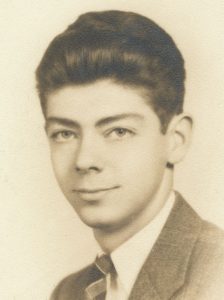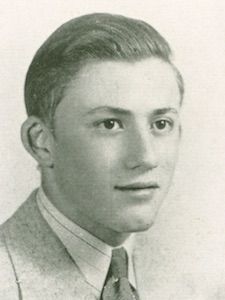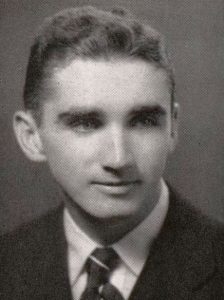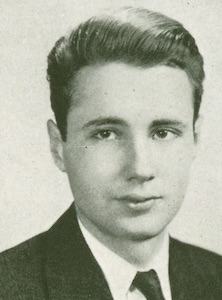The Muhlenberg Memories Project
Cultural Experiences
James A. Hemstreet ’44 wrote from the town of Cannes, in the Riviera of Southern France. Hemstreet told his reader “to grab your map of France. It is a super resort of the world famous Riveria [sic]. Special permission is necessary to get into the town, and as a result, few men in uniform—particularly Americans—tramp the streets. The population all along the Riveria is strongly blended with Italian blood, so that we have had a very little contact with what you might call a real French community. The town of C—is an exception! High class French money bags established themselves here, years ago, and those who outlasted the German occupation, still have plenty of green lettuce to throw around.
Beattie and [I] quartered ourselves in one of the old time swank hotels, located directly across the street from the sandy beach. In peacetime, rooms in the Hotel M—began at $10. a day. Ah, it was seventh heaven: a bathtub, and hot water; a turn of the faucet, and water ran out; push a button and the toilet flushed. None of these exclusive luxuries do we enjoy aboard an LCT” (18 September 1944).

Luxuries, while not commonplace, were certainly enjoyed, especially alcoholic beverages.
Wilmer Cressman ‘42 regaled in the comfort of the officer’s club in a 1944 letter. “An occasional officers club looms up like an oasis upon occasions, but outside of that the old Almaack is home, office, corner store, movie, and restaurant. I don’t think you need write the secretary of the Navy about prohibition for JG’s. His assistants out here make certain that we don’t get to them very often. Not all of these clubs are like Circlon [a nightclub in Allentown], you know. Still, after a while whiskey and plain old ice water looks a lot better than nothing. That’s what makes Pacific duty so rugged” (24 October 1944).

Lt. John R. Kern, Jr. ‘42: “I have finally recieved [sic] a relatively permanent address. After being relayed from station to station for such a long time, I feel that I have finally hit the soldier’s utopia. Now I can unpack my bags, send in laundry, and enjoy all those comforts that yank advertises.
Since my arrival here, I have recieved [sic] one of your letters–the one written by your girl Friday. It really is good to hear from the boys, but I’ll have to correct one of your statements. I don’t believe that Wilmer Cressman, the top kick on the ’42 Weekly, visits the right clubs in England. This business of no Scotch and warm beer is vicious Nazi propaganda. Here we have Scotch enough and ice enough to outlast a dozen Hitlers and about a gross of Mussilinis [sic]. Where is this club? That, gentlemen, is a military secret” (20 June 1944).


Feeding active duty men was serious business, whether they were training for an assignment, on the frontlines, or surviving in a fox hole. Food and drink, especially alcohol, fueled their bodies and, as the letters revealed, occupied their minds. While men wrote about alcohol, they also describe many foods, dishes and holiday meals they enjoyed. Ice cream was one such favorite.
Raphael Nies ‘45, writing from Fukuoha, Japan: “There are a few cabarets in town where you can go to dance and drink Jap* beer. The girls are Japanese too, but better than the average. The places are run by Japanese and they have American music. Incidentally, this Jap beer is very good. Much smoother than what we get here in cans and bottles” (18 February 1946).
James A. Hemstreet, ‘44 writes, “It is high time I was dropping you another note and thank you again for your informative alumni letters. Enclosed in this letter you will find some foreign currency and several photos. The size 120 camera snapshots, I took, myself, with the German Zeiss camera which I was able to buy in Rome on the third day after the city fell. These are a small sample of some of the shots I got. Mother has the complete collection” (5 August 1944).

On March 6, 1946, Hemstreet writes again, this time from Kwagalein, Marshall Islands, about the pleasant climate and about food, again, in a post script, “In case you think we’re starving, we are eating steaks and hams with plenty of butter, an abundant supply of fresh apples, oranges, potatoes, carrots, etc. and about every kind of canned goods that we could possibly need” (6 March 1946).
Writing from Bismarck Archipelago, Papua New Guinea, Warren Himmelberger ‘43 wrote about an unusual theater experience, “This island has many coconut plantations, and we are situated in the middle of one. One night, while sitting at the very rear of our movie theater, a thud of a falling coconut was heard too loudly for safety. The coconut fell about four feet from my head. I took it back to the barracks, but someone drank the milk the next morning before I got the chance”(February 4, 1945).

While it was common for men to acknowledge their gratitude for food and drink, they also revealed their love interests with marriage proposals and weddings as well as events where they could meet or dance with women. For example, in writing about women and cabarets in Fukuoha, Japan, “Ray” Nies ‘45, wrote “There are some Army nurses and WACs in town but all we can do is look at them. They sure are good to look at though” (18 February 1946).

Nathan Kline, at the tender age of 18, took leave to visit Paris. “Uh, we weren’t allowed to go to Paris because the snipers were still there. So, we– I snuck into Paris, took my insignia off. And the first place I went was the Folies Bergere. Where else would I go? So, anyway, I got to know the bartender and he spoke German and so we became pretty friendly. And what he did is he– he sent me back into the dressing room. Here these– I’m 18 years old, here are these gals, six foot tall, and very, not dressed very much that had–they were sitting on my lap. I’m going crazy” (Oral history, 24 August 2015).
Paul Fritsch ‘40, writing from the Philippines, found the local women quite attractive. “We have a swell set up here. Have been to a few social functions here at the local colony. Some very very nice looking women too, however according to their customs you have to be introduced first and then you have to take the old man and other along with the girl” (20 May 1945).

Some men chose to marry early in their military service. Wilmer Cressman ‘42 found one young woman in Indiana, announcing, “So in the Engagement column– the startling news– Wilmer H. Cressman, of Allentown, PA., to Mildred M. Farney of South Bend, Indiana” (10 January 1943).
A few men found women troublesome in different ways. Woodrow Guth ’41 complained about nurses, “A nurse, like any other women, are too unreasonable and impractical. Also get commissioned wages for a six hour WORKLESS day” (6 June 1944).

As the men experienced cultures far beyond their ken, their provincialism was sometimes revealed in their descriptions of foreign locales and people.
Stationed in Iran, Bruce H. Kuntz ‘40, wrote, “So far haven’t seen a lot of the country so I can’t say much about it. However it certainly isn’t anything like the picture ‘Arabian Nights’ would have you believe” (4 April 1943). The next month, he wrote about being disappointed with Iran, complaining that all he saw was, “desert, dirty natives, jackals and mosquitoes. The jackals were the worst. Every night when everything was quiet, they’d start the most infernal howling human ears ever heard. And there wasn’t a thing to do about it either but get accustomed to it so that’s what we did” (25 May 1943).

Harry Becker ‘47 understood Hollywood’s version of glamour compared to what he saw in India. “This business of war is not a series of glamorous adventures as the movies paint it to be. It is a darn tough job. The first week or so we spent sleeping on the ground. Anyone who has been in India a week or more certainly realizes America is worth fighting for. I used to pay money at the fairs back home to see the freaks of nature; but now, I am seeing them for nothing. Believe me, one really sees some pitiful sights. Personally, I can’t see how it could be possible to live in such filth and poverty as these poor natives do here in India” (25 May 1943).

Also stationed “somewhere” in India, Eugene G. Schneck ‘36 shared his views of the native people. “ . . . I’ve gathered from the natives that almost anyone who is in possession of more than one shirt and one pair of pants, wears socks and shoes, and has a few more rupees than a native ever has, automatically becomes a ‘rajah.’ So naturally, all Americans are rajahs even though, at times, we may be ‘rupee-less'”(18 April 1944).


